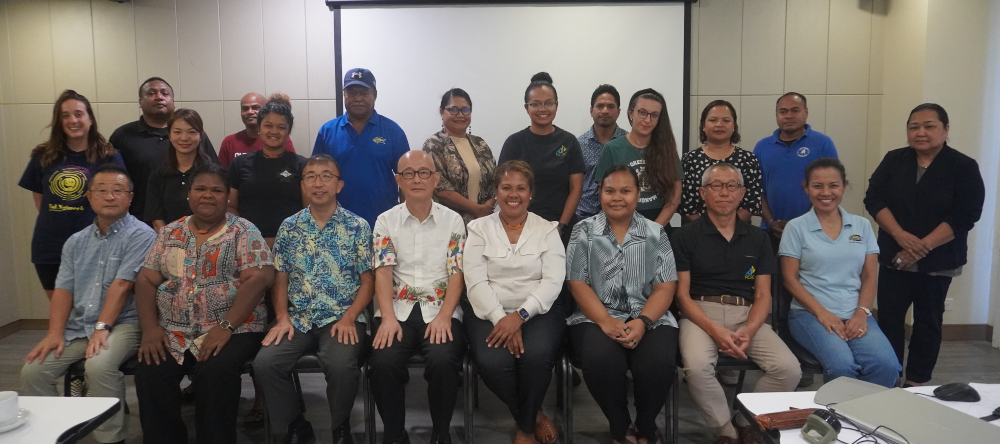- Event
JICA and PICRC celebrate the conclusion of their coastal ecosystem management project
On January 9, 2025, the Palau International Coral Reef Center (PICRC) and the Japan International Cooperation Agency (JICA) hosted the final Joint Coordination Committee (JCC) meeting for their ‘Project for Enhancement of Integrated Management of Coastal Ecosystem in Palau for Strengthening Their Resilience to Climate Change’. As the project wrapped up this month, the event celebrated the project’s achievements and brought together key stakeholders and partners to discuss future directions for coastal ecosystem management in Palau. Attendees included representatives from the JICA Palau Office, JICA Headquarters (HQ), the Embassy of Japan, the Ministry of Agriculture, Fisheries and Environment (MAFE), Environmental Quality Protection Board (EQPB), PALARIS, the Ministry of Finance (MOF), and the states of Ngiwal and Airai.
The meeting was guided by Project Director and PICRC CEO Roxanne Siual Blesam, with opening remarks emphasizing the project’s critical role in strengthening Palau’s coastal resilience. JICA Palau’s Chief Representative Aoki Tsunenori also reflected on the value of collaboration in his opening speech. Geraldine Rengiil, Project Manager and Director of PICRC’s Research Department, provided an overview of the project’s objective of sustainably enhancing coastal ecosystem resilience to climate change through policy, research, and communication, education, and public awareness (CEPA).
Presentations included results from mangrove and sediment monitoring in Airai and Ngiwal, led by mangrove ecosystem expert Yoichi Harada, and updates on CEPA activities such as the recent opening of the mangrove ecotour in Ngiwal and the creation of a mangrove guidebook for Palau Community College students. Tadashi Kimura, Chief Advisor for the project, presented recommendations for the continued management of coastal ecosystems, suggesting a three-year plan for the “Dmakeiukl” states (Aimeliik, Ngardmau, Ngaremlengui, and Ngatpang) and expanding the mangrove management network to include the east coast of Babeldaob and outer island states in the future.
The presentations reflected contributions from PICRC researchers Greta Sartori, Elsei Tellei, and Victor Nestor, as well as project members Nolan Rebluud and Yuki Okada, and JICA HQ members Noriaki Sakaguchi and Hiroaki Asaoka. Discussions highlighted the importance of continued national and state-level collaboration, further community outreach, and incorporating traditional Palauan knowledge into broader climate resilience efforts. Participants also stressed the project’s value as a foundation for addressing climate change with tangible, community-centered results. JICA Palau’s Aoki Tsunenori emphasized the importance of unified efforts: “While we may have different mandates, we are all working toward the same objectives: protecting Palau’s precious ecosystems together.”
Closing remarks from Ambassador Hiroyuki Orikasa echoed Aoki’s sentiment, describing this final meeting as a “kick-off” for future initiatives. He highlighted Palau’s opportunity to lead by example in climate resilience and conservation, urging state governments to engage actively, communities to champion conservation strategies, and students to inspire future generations. He called for maintaining momentum and using the project’s successes to inspire further actions locally and nationally.
“We would like to express our gratitude to JICA for their invaluable work and expertise in ensuring the success of this project. We also extend our appreciation to the Embassy of Japan for their ongoing support of the Center. More importantly, we thank the implementing agencies, partners, and State agencies for their active participation and commitment to conservation efforts, which greatly benefit the Palauan communities.” said Roxanne Siual Blesam, Project Director and PICRC CEO.


